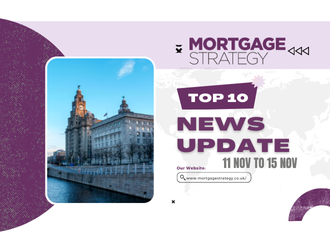
Mortgage Strategy’s Top 10 Stories of the Week
This week, Nationwide and Virgin Money join the latest wave of lenders increasing rates, while Santander announces a series of adjustments across its offerings. Explore these updates and more in our top 10 roundup below:
Nationwide and Virgin become latest lenders to lift rates
Nationwide and Virgin Money have both raised mortgage rates. Nationwide has adjusted rates across various fixed-rate and tracker products, including a 0.25% reduction on two-year trackers following the Bank of England’s rate cut. However, some fixed-rate products have increased by up to 0.20%. Virgin Money has lifted rates on a range of products, including buy-to-let, remortgages, and product transfers, with increases of up to 0.25%. These changes reflect current market conditions and recent rate movements.
Santander outlines raft of rate changes across range
Santander has increased most of its residential and buy-to-let (BTL) fixed rates by up to 0.31% since 12 November. Tracker rates, however, will decrease by 0.25% to reflect the recent Bank of England base rate cut. The Standard Variable Rate will also drop by 0.25%. Existing customers with base rate trackers or the standard variable rate will see their rates reduce from 3 December. Additionally, deadlines for new business and product transfers will be extended by one month.
Santander, HSBC and TSB all increase rates despite BoE cut
Santander, HSBC, and TSB have raised mortgage rates, effective 12 November, despite the Bank of England’s recent rate cut to 4.75%. TSB increased its two- and five-year fixed rates for First Time Buyers and Home Movers by up to 0.30%. Santander raised rates on selected residential fixed products, large loans, and new builds. HSBC also announced rate hikes. Experts suggest rising swap rates, lender funding costs, and market dynamics are behind the increases, even after the base rate drop.
Trump victory may have positive impact on UK housing market: SLE
Donald Trump’s recent US presidential victory could positively impact the UK housing market, according to panellists at the Specialist Lending Expo. Fleet Mortgages’ Steve Cox highlighted the significant presence of US investment in the UK, particularly in securitised markets. A strong US economy could attract more investment into the UK, benefiting sectors like specialist lending. However, concerns over tariffs and defence spending were also raised, as these could pose risks. The impact of Trump’s policies on the UK remains uncertain.
Product options suffer largest slump in almost 18 months: Moneyfacts
Mortgage product options dropped by 3.7% in November, marking the largest decline since July 2023, according to Moneyfacts. The total number of products fell to 6,402, reflecting market uncertainty. The average shelf-life of mortgage products decreased from 21 days in October to 17 days. Despite the slump, product availability is still higher than in November 2022. Rates for two-year fixed and tracker mortgages rose slightly, while five-year rates saw a modest increase. Experts warn of rising rates next year and advise borrowers to act before reverting to higher rates.
Metro Bank hit with £16m fine from FCA
FCA to publish ‘fundamentally reshaped’ name and shame plans
The FCA plans to release revised “name and shame” proposals within the next week, addressing concerns raised by industry bodies. Originally met with strong opposition, the new approach will include more notice for firms being investigated and limit disclosures to exceptional cases. FCA CEO Nikhil Rathi acknowledged the concerns over destabilising firms under investigation but emphasised the need for transparency. The revised plan will be presented to the FCA board in early 2025, following discussions with the House of Lords’ committee.
Lenders pull sub-4% loans amid ‘higher for longer’ rate environment
Major UK lenders, including Barclays and NatWest, have withdrawn all sub-4% fixed-rate mortgages, despite the Bank of England’s recent base rate cut. This follows similar moves by Santander, HSBC, Nationwide, and TSB as lenders adjust to a “higher for longer” rate environment. The Bank’s recent forecast suggests slower rate cuts due to inflation concerns, and the impact of global economic pressures, including US trade threats. Currently, Allied Irish Bank remains the only large lender offering rates below 4%.
Mortgage repossessions lift 56% in Q3: MoJ
Mortgage repossession claims rose 56% to 6,525 in Q3 2024, returning to pre-pandemic levels, according to Ministry of Justice data. This follows a trend of rising repossession actions since 2021, although still below pre-Covid levels. Landlord repossessions increased 2% to 25,418. The median time for mortgage repossessions fell to 43.9 weeks, down from 57.8 weeks. Propertymark’s Nathan Emerson highlighted the ongoing financial pressures on homeowners, particularly first-time buyers, and called for more housing and financial relief.
Barclays outline rate increases across range
Barclays is increasing mortgage rates across its range, effective from 14 November. Key changes include a rise from 3.96% to 4.30% on a two-year fixed residential purchase product, and from 4.12% to 4.44% on a five-year fixed. For remortgages, rates will increase from 4% to 4.34% for a two-year fixed and from 4.18% to 4.50% for a five-year fixed. Buy-to-let rates are also rising, with two-year fixed rates increasing from 5.28% to 5.38%. Barclays cited recent volatility in swap rates as the cause for the hik



